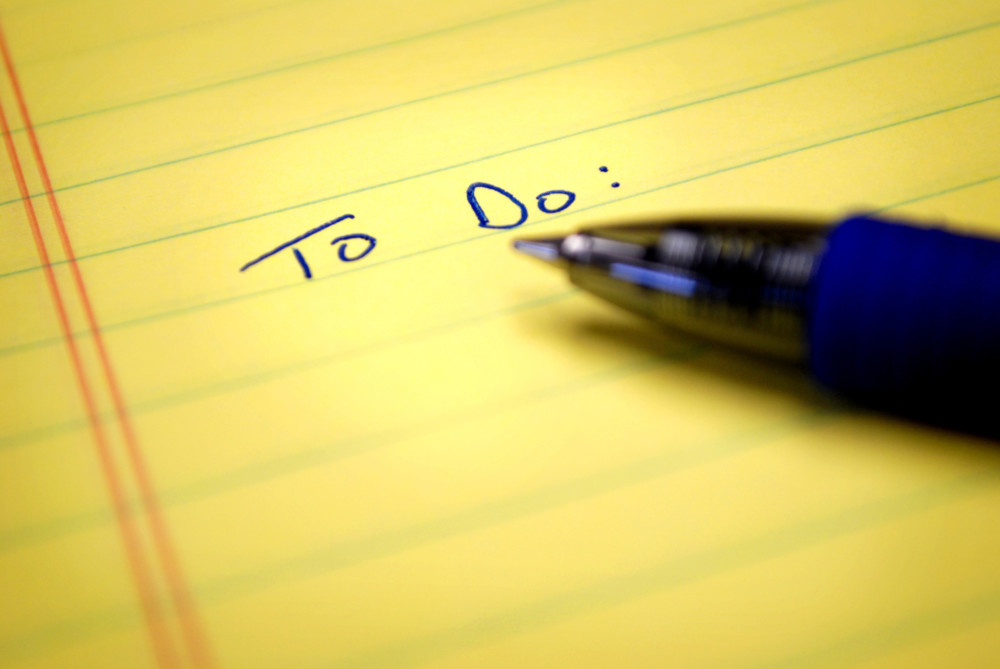By Cindy Dampier
Chicago Tribune
WWR Article Summary (tl;dr) Psychologist and author Stephanie Sarkis says that when it comes to the to-do list, you need to learn to think small. “Big goals are stressful for the brain,” says Sarkis. “It’s much less stress for the brain if you give it a small task with a reward than if you give it a big task.” In other words, ditch those big-ticket to-do lists.
Chicago Tribune
It’s January, the National Month of Feeling Bad About Yourself. I know this, because holiday decorations, which have been spreading cheer and those parasitic glitter specks since October, have now given way to new, seasonally appropriate displays, like racks of athletic shoes (hey, what happened to those cozy slippers?!) and self-help books (should you ignite your life, stop denying your greatness, or jump on the Swedish death-cleaning bandwagon?)
As is my annual custom, I reject the self-help of others. Instead, I make a to-do list.
If you follow the hallowed tradition of the New Year’s to-do list, I salute you in the spirit of this season.
Because, basically, there is no quicker path to the heart of January despair than that little yellow Post-it full of Big Things we need to get done.
My lists will be decorating my desk, my kitchen counter and occasionally the fridge all season long, cheerfully taunting me about all that I am not getting done as I race past on the way to do something else. Some of them will slowly slink away into notebooks and pockets and other places where I will discover them, months later, with a nostalgic rush of pure panic. No, I still haven’t reconfigured my kitchen storage. Or dealt with the years of photos on my phone/computer.
As celebratory as all this sounds, I’m willing to admit that there might be a better way. Which is why I called up Stephanie Sarkis, a psychologist and author who has written about something called the Zeigarnik effect.
Named after a Soviet psychologist who got inspired while sitting around in a cafe (she was intrigued by her waiter’s ability to remember a long list of orders), the Zeigarnik effect notes that we remember interrupted tasks much more clearly and urgently than we recall completed ones. Those unfinished tasks take up a lot of space in our heads, like an itch that our brains just can’t scratch.
“Our brains need closure,” says Sarkis. “We need to wrap things up, we crave completion.” Thus, the anxiety that sets in when we realize that we still haven’t crossed “Foster new healthy relationship with co-workers” or “Clean out the closet” off our lists.
As any self-help book worth its future spot on the Salvation Army shelves will tell you, you’re doing it wrong.
When it comes to the to-do list, you need to learn to think small. “Big goals are stressful for the brain,” says Sarkis. “It’s much less stress for the brain if you give it a small task with a reward than if you give it a big task.” In other words, ditch those big-ticket to-do lists. Quick, before they clog up your completion-craving brain. “If you’re a goal-driven person,” Sarkis says, “it’s kind of a paradigm shift.”
Stay with us here: We’re not saying you can’t have goals. Instead, just replace those big projects with bite-size, specific tasks. Goals sliced as thin as a low-cal potato chip.
“Every time you finish a task,” says Sarkis, “you get a little dose of dopamine, and then your brain is like, ‘OK, great, that felt good. Let’s do that again.’ And you actually get a lot more accomplished.” So, instead of “sell the house and move to New Zealand,” your task might be “call my brother-in-law and ask for the name of his Realtor.”
Surprisingly, even the smallest concrete action will move you toward that big goal faster than guilt and emotional paralysis. Next thing you know, you’ll be celebrating Christmas in the summertime and showing off your American accent.
This works even if your goals are life-changing in a less obvious way. Like cleaning up the closet.
This, in fact, is my favorite example of the January-beating, new, radically lackadaisical path to getting things done.
Here’s how it works: Get a paper grocery bag, and set it on the floor of your closet. Each day, when you’re standing there, noticing that blouse that makes you feel ugly or that too-small pair of pants leering at you judgmentally, grab that offending item and drop it in the bag. Then walk away. In a couple of days, the bag will be full. Take it to your car or the garage, on its way to be donated to a charity of your choice. Stop to enjoy the micro-dose of dopamine coursing through your brain. Get another empty bag, and repeat.
Do not waste brain power thinking about cleaning up your closet. Do not tell people you are cleaning out your closet. Do not write “clean closet” on a Post-it. One day soon, you will look up and discover … your closet is cleaned out. (Insert dopamine here.) And once you have the system down, you’ll realize that you could literally do … anything. Including celebrating January in a whole new way.














































































































































































































































































































































































